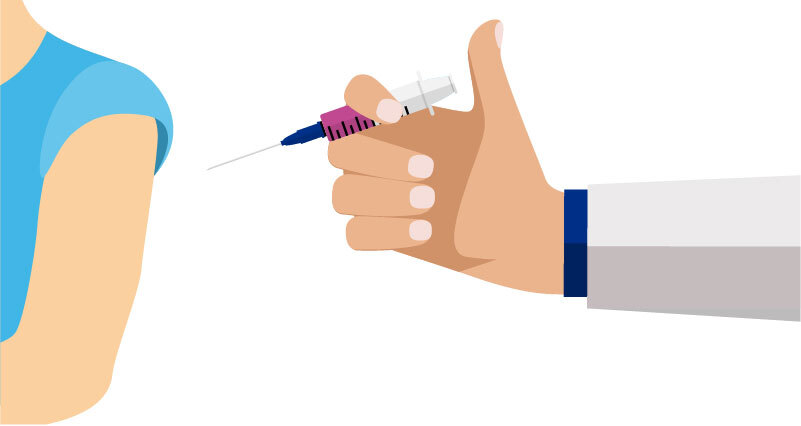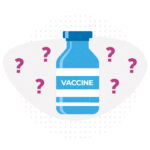Answers to your questions about the COVID-19 vaccine

Update: On May 10, 2021, the U.S. Food and Drug Administration (FDA) granted emergency authorization for use of the Pfizer vaccine to prevent COVID-19 in teens between the ages of 12 and 15. This broadens the group of people eligible for the Pfizer vaccine to those ages 12 and older.
To help answer the most common questions about the COVID-19 vaccines, we reached out to Drs. Melanie Dubois and Kristin Moffitt, infectious disease specialists at Boston Children’s Hospital.
What vaccines are approved for COVID-19?
At this time, the FDA has approved three COVID-19 vaccines: one from Pfizer (now approved for those ages 12 and older), one from Moderna, and one from Johnson & Johnson (both approved for ages 18 and older).
There are many other vaccines in development for COVID-19, with different mechanisms to protect against the virus (such as viral vector vaccines and protein-based vaccines).
Is the vaccine safe for kids?
While it’s encouraging that these two vaccines are generally safe in adults, we still have limited data on their safety in children under age 12. Eventually, there will also be clinical trials in children younger than 12 to ensure that we have safety data in this population.
When will they start giving the COVID-19 vaccine to kids?
While the guidelines are similar nationally, the specific guidelines may vary from state to state. In Massachusetts, teens ages 12 and older are now eligible to receive the Pfizer vaccine. Children under age 12 will need to wait until further data is available from clinical trials in children.
After our high-risk and older family members get vaccinated, will we be able to visit them again?
For now, it’s important that everyone continue to wear masks and practice social-distancing measures even after receiving the vaccine. While the COVID-19 vaccine prevents symptomatic COVID-19 infection, it’s unclear if it prevents spreading of the virus from person to person. We are hopeful that the vaccine will also reduce spreading of the virus this way, particularly as more people receive the vaccine, but this is still being studied.
Also, it’s important to remember that both the Pfizer and Moderna vaccines require two doses to be considered fully vaccinated.
So although it’s encouraging to know that those at risk in your family will have more protection against COVID-19 after receiving the vaccine, it’s best to continue social distancing measures until we know more.
How long does vaccine protection from COVID-19 last?
We’re not sure yet. We will need to continue to follow patients who receive the vaccine to know how long immunity lasts. But from the data we have so far, it seems that it lasts at least several months.
Does getting the vaccine hurt?
People who receive the vaccine may have mild symptoms, including a sore arm, mild fever, fatigue, and a headache, but these usually go away in a day or two. These symptoms also show that your immune system is responding to the vaccine. Some people have more serious side effects, such as allergic reactions, but these are rare.
Can the vaccine give me COVID-19?
No. The goal of the vaccine is to prevent symptomatic COVID-19 and provide you with protection against the virus. None of the authorized vaccines contain the actual virus, so while the vaccine may lead to mild symptoms that last for a couple days, it will not make you sick with COVID-19.
Should I get the vaccine if I’ve already had COVID-19?
Yes. Even if you’ve already had a test showing that you’ve had COVID-19, you should still get a vaccine if you are eligible. Although your body makes antibodies after being infected with COVID-19, experts don’t know how long these antibodies will protect you from the virus.
Learn more about Boston Children’s response to COVID-19.
Related Posts :
-

Study highlights the severity of acute necrotizing encephalopathy in kids with the flu
For most children, influenza (flu) usually means unpleasant symptoms like a fever, sore throat, and achy muscles. But for a ...
-

Model enables study of age-specific responses to COVID mRNA vaccines in a dish
mRNA vaccines clearly saved lives during the COVID-19 pandemic, but several studies suggest that older people had a somewhat reduced ...
-

Will people accept a fentanyl vaccine? Interviews draw thoughtful responses
In 2022, more than 100,000 people died from opioid overdoses in the U.S., according to the National Center for Health Statistics. ...
-

New insight into the effects of PPIs in children
Proton-pump inhibitors (PPIs) are frequently prescribed to suppress stomach acid in patients with gastroesophageal reflux disease (GERD). Prescribing rates of ...





